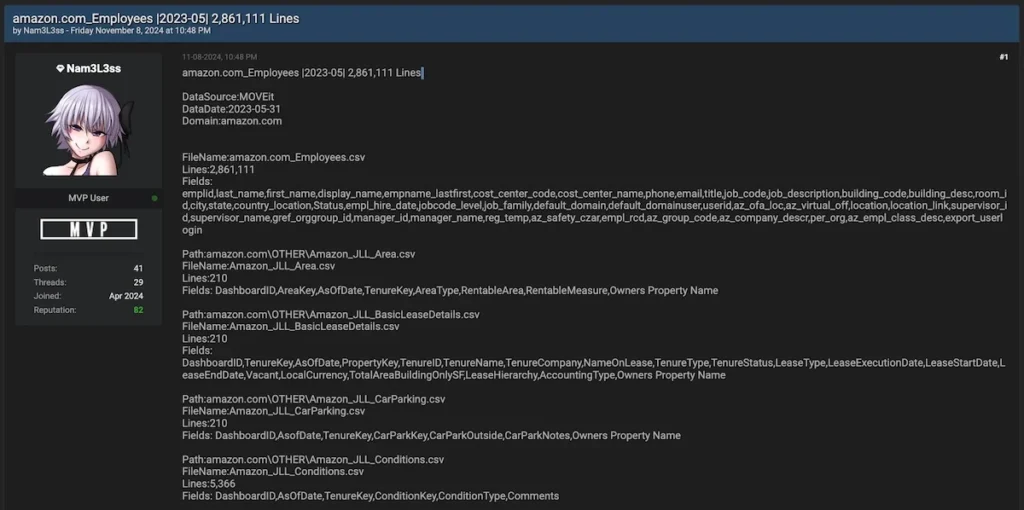
Amazon confirms employee data breach after vendor hack
Amazon confirmed a data breach involving employee information after data allegedly stolen during the May 2023 MOVEit attacks was leaked on a hacking forum.
The threat actor behind this data leak, known as Nam3L3ss, published over 2.8 million lines of Amazon employee data, including names, contact information, building locations, email addresses, and more.
Amazon spokesperson Adam Montgomery confirmed Nam3L3ss’ claims, adding that this data was stolen from systems belonging to a third-party service provider.
“Amazon and AWS systems remain secure, and we have not experienced a security event. We were notified about a security event at one of our property management vendors that impacted several of its customers including Amazon,” Montgomery said.
“The only Amazon information involved was employee work contact information, for example work email addresses, desk phone numbers, and building locations.”
The company said the breached vendor only had access to employee contact information, and the attackers didn’t access or steal sensitive employee information like Social Security numbers, government identification, or financial information. Amazon added that the vendor has since patched the security vulnerability used in the attack.

Nam3L3ss has also leaked the data from twenty-five other companies. However, they say some of the data was obtained from other sources, including ransom gangs’ leak sites and exposed AWS and Azure buckers.
“I download entire databases from exposed web sources including mysql, postgres, SQL Server databases and backups, azure databases and backups etc and then convert them to csv or other format,” they said.
“DO NOT ask me for access to my storage etc, at present I have well over 250TB of archived database files etc.”
The list of companies whose data was stolen in MOVEit attacks or harvested from Internet-exposed resources and has now been leaked on the hacking forum includes Lenovo, HP, TIAA, Schwab, HSBC, Delta, McDonald’s, and Metlife, among others (as shown in the table below).
GeekFeed has contacted multiple companies and will update this article when additional information is available.
| Company | Date Stolen | Number of Employees |
| Lenovo | 2023-05 | 45,522 |
| McDonald’s | 2023-05 | 3,295 |
| HP | 2023-05 | 104,119 |
| City National Bank | 2023-05 | 9,358 |
| BT | 2023-05 | 15,347 |
| dsm-firmenich | 2023-05 | 13,248 |
| Rush University | 2023-05 | 15,853 |
| URBN | 2023-05 | 17,553 |
| Westinghouse | 2023-05 | 18,193 |
| UBS | 2023-05 | 20,462 |
| TIAA | 2023-05 | 23,857 |
| OmnicomGroup | 2023-05 | 37,320 |
| Bristol-Myers Squibb | 2023-05 | 37,497 |
| 3M | 2023-05 | 48,630 |
| Schwab | 2023-05 | 49,356 |
| Leidos | 2023-05 | 52,610 |
| Canada Post | 2023-05 | 69,860 |
| Amazon | 2023-05 | 2,861,111 |
| Delta | 2023-05 | 57,317 |
| Applied Materials | 2023-05 | 53,170 |
| Cardinal Health | 2023-05 | 407,437 |
| US Bank | 2023-05 | 114,076 |
| fmr.com | 2023-05 | 124,464 |
| HSBC | 2023-05 | 280,693 |
| MetLife | 2023-05 | 585,130 |
The MOVEit data-theft attacks
The Clop ransomware gang was behind a wave of data theft attacks starting on May 27, 2023. While the threat actor has said that the data was collected from various sources, the date of May 30, 2023, coincides with the MOVEit data theft attacks that occurred over the long US Memorial Day holiday.
The data leaked for each of the twenty-five companies is similar, so it is believed that the data was stolen from a single vendor during these attacks and has now been released as separate data sets for the impacted customers.
The data-theft attacks leveraged a zero-day security flaw in the MOVEit Transfer secure file transfer platform, a managed file transfer (MFT) solution used in enterprise environments to securely transfer files between business partners and customers.
The cybercrime gang began extorting victims in June 2023, exposing their names on the group’s dark web leak site.
The fallout from these attacks impacted hundreds of organizations worldwide, with tens of millions of people having their data stolen and used in extortion schemes or leaked online since then
Multiple U.S. federal agencies and two U.S. Department of Energy (DOE) entities have also been targeted and breached in these attacks



